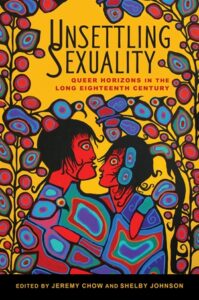
Jeremy Chow
Editor(s)
Shelby Johnson
Hardback
October 2024 • ISBN 9781644533499 • $120.00
Paperback
October 2024 • ISBN 9781644533482 • $39.95
* E-Book Available
Order Online
Unsettling Sexuality was recently listed as one of The Guild of Queer Early Modernists’ Top Ten Books of 2025!
This book is also freely available online as an Open Access digital edition on the Mainfold platform, here.
Unsettling Sexuality: Queer Horizons in the Long Eighteenth Century challenges the traditional ways that scholarship has approached sexuality, gender nonconformity, and sex (as well as its absence) in the long eighteenth century. Drawing from recent and emerging criticisms in Middle-Eastern and Asian studies, Black studies, and Native American and Indigenous studies, the collected authors perform intersectional queer readings, reimagine queer historiographic methods, and spearhead new citational models that can invigorate the field. Contributors read with and against diverse European, transatlantic, and global archives to explore mutually informative frameworks of gender, sexuality, race, indigeneity, ability, and class. In charting multidirectional queer horizons, this collection locates new prospective desires and intimacies in the literature, culture, and media of the period to imagine new directions and simultaneously unsettle eighteenth-century studies.
About the Editors
Shelby Johnson is Assistant Professor of English at Oklahoma State University, where she researches and teaches on gender and sexuality, race and Indigenous studies, and environmental humanities in early literatures of the Americas. In her recent book, The Rich Earth Between Us: The Intimate Grounds of Race and Sexuality in the Atlantic World (University of North Carolina Press, 2024), she argues that figures of a gifted earth organize a set of worlding practices that ground and animate anticolonial intimacies in Black and Indigenous archives. Her scholarship has also appeared or is forthcoming in Multi-Ethnic Literature of the United States, The Eighteenth Century: Theory and Interpretation, Criticism, and European Romantic Review.
